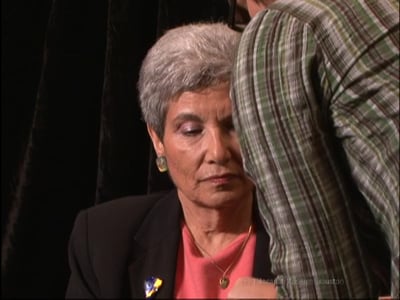Chaja Verveer spent years piecing together the events that shaped the first four years of her life. The youngest child of Emanuel and Henrietta Verveer, Chaja was born in Maarsbergen, Holland in 1941. It was the “wrong time” to be born, she reflected, referring to the period when Germany occupied Holland and, with the support of some of the Dutch people, isolated and murdered its Jews. When Chaja was only a year old, her family of six went into hiding, splitting up because they were too many to stay in one place. Chaja ended up in Leiden with the van den Bergs, a Dutch family active in the Resistance. Chaja became “Carla van den Berg” and the family presented her to the world as their own child.
In February 1944, the van den Bergs were betrayed and 3-year-old Chaja was sent to Westerbork, a transit camp in northeastern Holland. Trains departed regularly from Westerbork for the extermination camps in German-occupied Poland. Chaja has no memories of the months she spent in Westerbork, but she learned years later that Sonja Verkozen was one of the women who cared for her there. Sonja’s barrack was used as an orphanage for children who had been sent to the camp without their parents. On September 13, 1944, the last train left Westerbork. On it were the 51 children from the “orphanage.” Chaja was one of them. All of the children had cardboard signs hung around their necks with the words Unbekanntes Kind (unknown child). Their first and last names and birthdates were followed by question marks because their captors did not know their identities. After three grueling days and nights on the train, the children arrived in Bergen Belsen. A teenage prisoner, Sera Jacobs, befriended Carla during her three-month stay there. The children were subsequently sent to Theresienstadt, a ghetto and transit camp in Czechoslovakia. There, Carla was reunited with Mrs. Verkozen.
Liberated in May 1945, Chaja stayed briefly with her mother before being sent to Switzerland to recuperate. When she returned she joined her mother and her three brothers in The Hague. Life was terribly difficult. Chaja’s father had been executed in 1944 for his activities with the Resistance and Henrietta struggled to feed and clothe the children. It was hard for Chaja to adjust to life with a family that had grown unfamiliar to her. Chaja recalled a childhood that was “cold and bleak.”
In 1961, Chaja moved to Israel where she studied at Hebrew University in Jerusalem. During a trip to Austria in the late 1960s, she met her future husband. They lived briefly in Brazil and then came to the United States, eventually settling in Houston. Chaja was divorced in 1975 and married Jim Getola on October 29, 1977. A business consultant, Chaja is very involved with the Houston community. She serves on the board of Holocaust Museum Houston and is president of Child Survivors of the Holocaust, Houston. She co-chaired the Child Survivors of the Holocaust International Conference in Houston in 2001. Chaja believes that the traumas she endured as a child made her stronger: “No matter what circumstances you put me in, I’ll muddle through, there’s no question about it. I have faced difficult times and I have conquered them, because it all pales in perspective.”
Parents
Emanuel Verveer, d. Steenwijkerwold, Holland, 1944
Henrietta Alter Verveer, survived
Siblings
Yitzchak, survived
Josef, survived
David, survived





